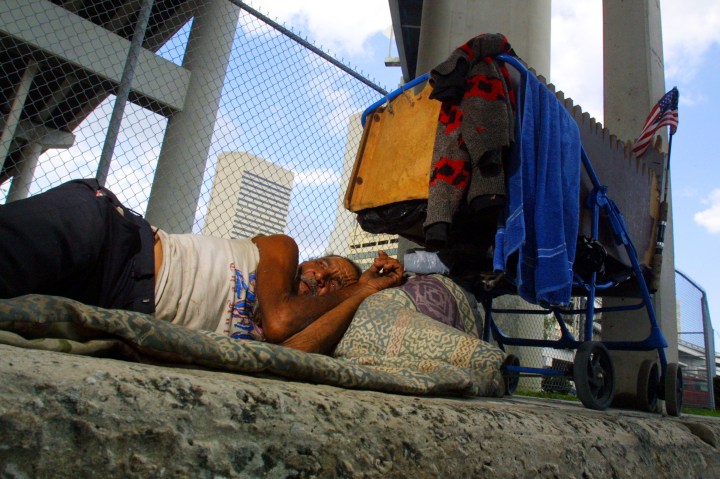
As poverty rises, South Florida organization for the homeless starts feeding neighbors, too
As poverty rises, South Florida organization for the homeless starts feeding neighbors, too

While some states’ unemployment rates differ significantly from the national joblessness rate, unemployment in Florida is close to that of the country. According to the latest data from the Bureau of Labor Statistics, 6.4% of Floridians were unemployed in November. Nationally, the unemployment rate was 6.7%.
A rise in poverty and homelessness has become a major concern as the pandemic recession has caused millions of people to lose their jobs. According to the U.S. Census Bureau, the Miami-Fort Lauderdale-Pompano Beach area ranks among the top metro areas for food scarcity and housing insecurity. The organization HOPE South Florida assists homeless people in the area with finding housing, food, employment and more. “Marketplace” host Kai Ryssdal spoke with Dr. Ted Greer Jr., the CEO of HOPE South Florida, about the increase in demand for the organization’s services since the start of the pandemic. The following is an edited transcript of their conversation.
Kai Ryssdal: This is a very big question with which to start this interview, but I’m going to give it a try anyway. What has the past, like, 10 months in this economy been like for you and your organization?
Ted Greer: Well, it’s certainly been challenging. We actually thought, we weren’t quite sure what our future would hold because we had to cancel, as most organizations, all fundraising events, which means a loss of income of about $1.1 million. So we weren’t quite sure what our future would hold, but we pivoted like everybody else. One of the things that became critical was meals. And so while we were providing prior to the pandemic about 200 meals a night, that quickly jumped to 400 or 500 meals per night. So that was the immediate shift that we have to make that became a priority versus housing.
Ryssdal: What does that look like when your demand for people looking for meals to eat more than doubles?
Greer: Well, I tell you what, it made the neighborhood nervous because our location became a hub for meals, not only for the homeless, which that’s our core business, but neighbors. We normally would have a sit-down meal prior to the pandemic. And for safety reasons to follow [Centers for Disease Control and Prevention] protocols, we established a grab-and-go concept. So what happened was you have 300 to 500 people standing in line waiting to grab a meal. That number just tripled because of the poverty, of course. So you had homeless people, you had neighbors, you had families, children, all in line side by side asking for a hot meal.
Ryssdal: Agencies like yours don’t just do food, right? There is housing, there’s, I’m sure, some kind of employment assistance. There’s probably, you know, personal hygiene, showers and clothing, right? I mean, you’re running the gamut here.
Greer: All of the above, yes, So our core is housing. So we’ve housed over 215 households since March. We provided 80,000 hot meals. One of the local municipalities asked us to take the lead in spending the federal dollars they received to help mitigate evictions because they weren’t quite sure how to manage that, since that’s what we do as a core of our business. And then the employment assistance, as you indicated. When COVID hit most of our families, who we put in housing, have to show income. Well, we had 30% of our clients lost income because they lost their jobs. And so that became a crisis for us as well. So we had to reach out and find how can we get folks gainfully employed once again. All of those became a priority for us. So the meals, the housing, the employment, keeping people from being evicted. It was just critical for us.
Ryssdal: Yeah. And look, by everything you’re saying, you’re going to keep on being successful. But I guess my my last question to you is how much longer can you keep doing this? Because there is some light at the end of the tunnel with the vaccine and, fingers crossed, but it’s been a tough 10 months. Do you have another six or eight months in you?
Greer: We’re going to keep going. We have to. This is our mandate. This is our calling, and I’m hoping the vaccine would help mitigate the crisis that we’re seeing. We’re concerned about an influx of evictions if the eviction moratorium is lifted by the feds. So we’re hoping that the new administration coming in would, you know, extend that so that we can get some legs under us to keep people safe and keep them in housing.
There’s a lot happening in the world. Through it all, Marketplace is here for you.
You rely on Marketplace to break down the world’s events and tell you how it affects you in a fact-based, approachable way. We rely on your financial support to keep making that possible.
Your donation today powers the independent journalism that you rely on. For just $5/month, you can help sustain Marketplace so we can keep reporting on the things that matter to you.


















